- App Startup Funding: Key Trends and Statistics
- Understanding Startup Funding for Mobile Apps
- Exploring Different Funding Sources for Mobile Apps
- Stages of Startup Funding for Mobile Apps
- Strategies to Attract App Investors
- Calculating Funding Requirements for Your App Startup
- Strategies to Outperform Competitors in App Funding
- Ensuring App Funding Success: Tips and Best Practices
- Summing it All Up
- FAQs
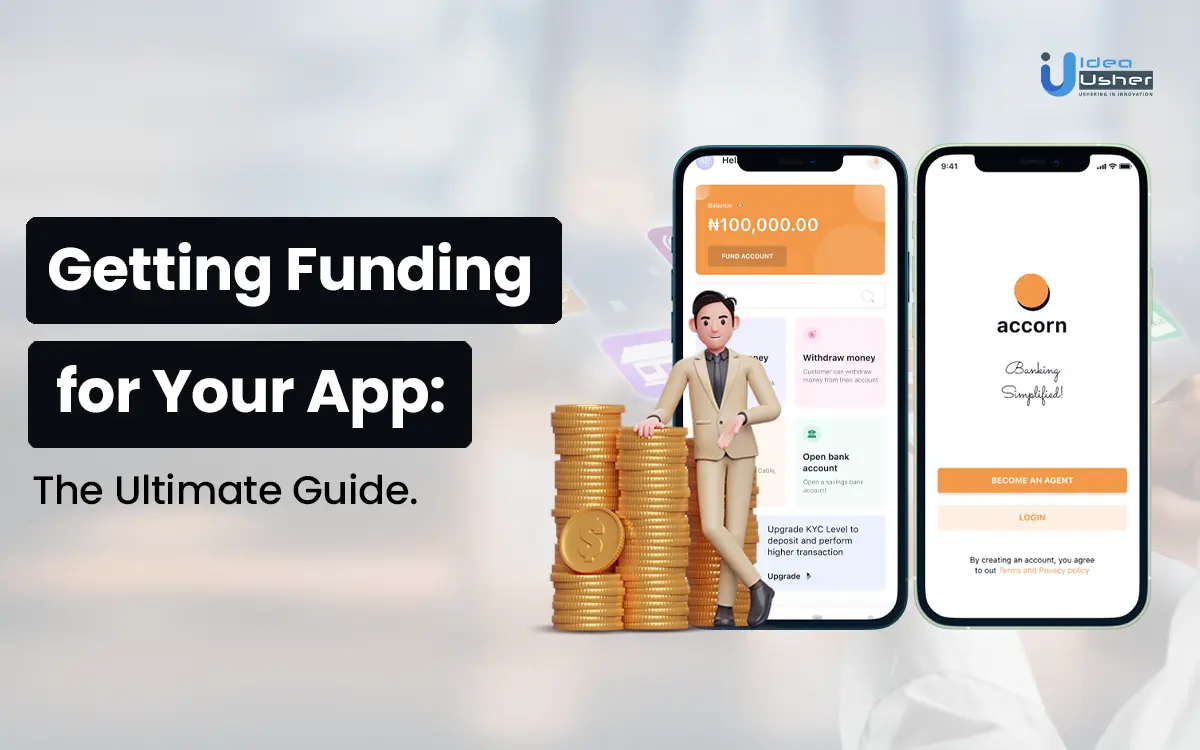
Do you have an amazing mobile app idea that could change the way people live, work, or interact? You envision a sleek design, an intuitive user interface, and countless lives it could impact. But there’s this one hurdle that’s keeping you from turning your vision into reality: funding.
Securing funding for your app is like embarking on a thrilling adventure, where every step brings you closer to achieving your dreams. It’s a journey that requires determination, resourcefulness, and a touch of strategic brilliance.
In this ultimate guide, we will unravel the secrets of securing funding for your app, providing you with invaluable insights and practical tips to navigate the funding landscape successfully. We’ll explore the various funding sources available, from bootstrapping to angel investors and venture capital. We’ll also delve into the stages of startup funding, helping you understand the progression of financial support. Lastly, we’ll evaluate the strategies and tools you need to attract investors, calculate your funding requirements, and outshine competitors.
So without any further ado, let’s dive right in!
- App Startup Funding: Key Trends and Statistics
- Understanding Startup Funding for Mobile Apps
- Exploring Different Funding Sources for Mobile Apps
- Stages of Startup Funding for Mobile Apps
- Strategies to Attract App Investors
- Calculating Funding Requirements for Your App Startup
- Strategies to Outperform Competitors in App Funding
- Ensuring App Funding Success: Tips and Best Practices
- Summing it All Up
- FAQs
App Startup Funding: Key Trends and Statistics
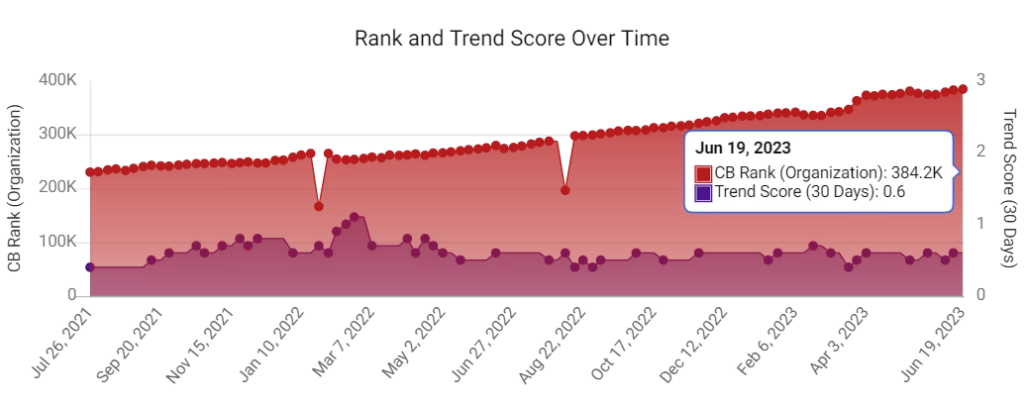
As per Crunchbase, from July 2021 to 2023, a total of 5 Billion+ U.S. dollars have been funded through an overall 7.5k+ funding rounds worldwide.
Leading investments were led by popular funding houses, VCs, and startup accelerators such as Y Combinator, Techstars, National Science Foundation, EASME – EU Executive Agency for SMEs, 500 Global, and others.
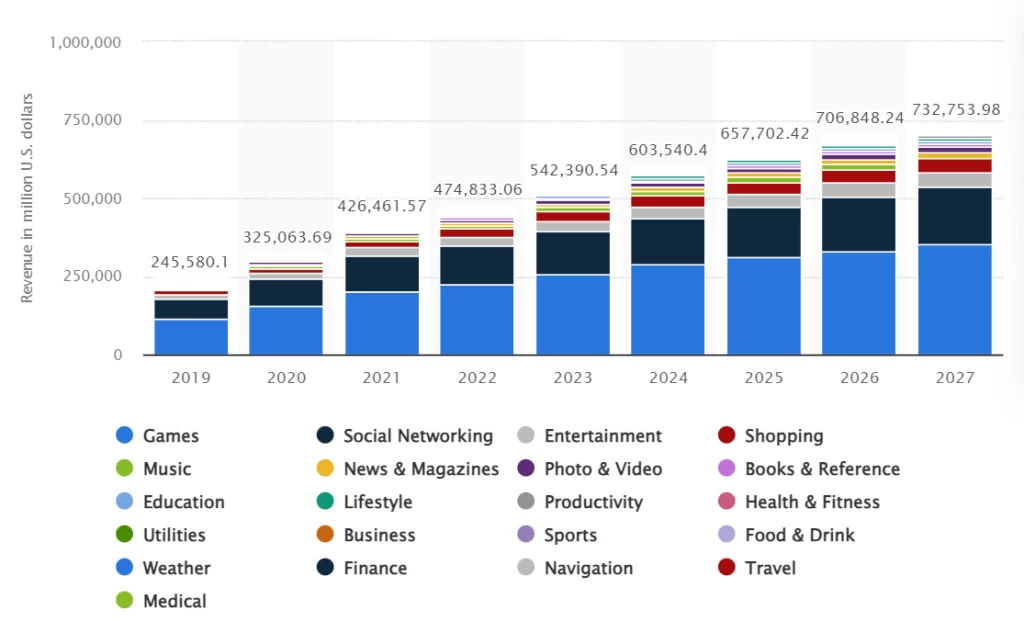
Statista forecasts that all segments of the app market are expected to witness substantial revenue growth by 2027.
This positive trend is projected to reach its peak across all 21 segments. Notably, the Games segment stands out with the highest revenue value of 352.1 million U.S. dollars.
Experts predict that AI and ML, ESG Factors, the emergence of new market segments, and government policies would determine the startup funding trends in the future.
Understanding Startup Funding for Mobile Apps
Startup funding is the lifeblood that fuels the growth and development of your app, turning your ideas into a tangible reality. To navigate the world of app funding, it’s crucial to have a solid understanding of how startup funding works, especially in mobile apps.
Funding for Your App Startup
Funding is vital for mobile app startups, as it provides the necessary resources to transform your app concept into a fully functional and marketable product. It enables you to hire skilled professionals, invest in cutting-edge technology, and execute effective marketing strategies. Funding also gives you the financial cushion to weather challenges, seize growth opportunities, and continuously innovate to stay ahead of the competition.
Key Factors for Successful Funding
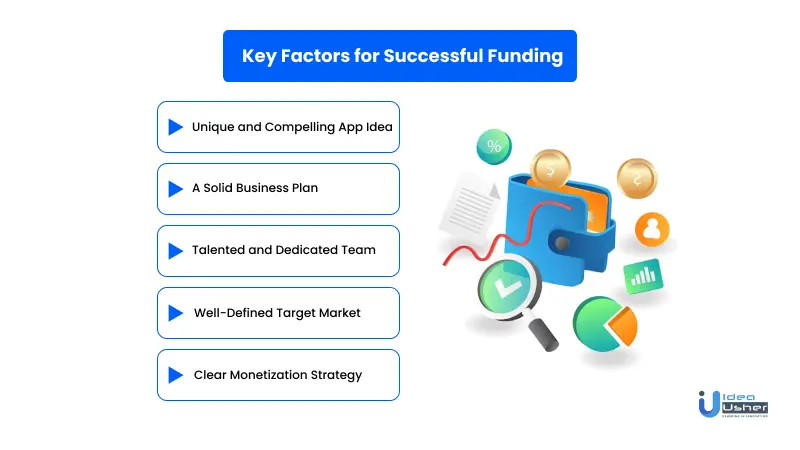
Securing funding for your app startup requires careful planning and consideration of several key factors. Factors such as a unique and compelling app idea, a solid business plan, a talented and dedicated team, a well-defined target market, and a clear monetization strategy all play crucial roles in attracting and convincing investors to fund your app.
i) Unique and Compelling App Idea
Your app should offer something distinctive and innovative that sets it apart from existing solutions in the market. A unique value proposition will capture investors’ attention and make your app stand out.
ii) A Solid Business Plan
A well-crafted business plan demonstrates your understanding of the market, competitors, and target audience. It outlines your app’s monetization strategy, growth projections, and potential return on investment, showcasing your ability to generate revenue and achieve profitability.
iii) Talented and Dedicated Team
Investors look for a team with a diverse skill set and a track record of success. Your team should possess the expertise needed to develop, market, and scale the app. Demonstrating passion, commitment, and a shared vision further instills confidence in investors.
iv) Well-Defined Target Market
Understanding your target audience is crucial for investors. Clearly define the demographics, pain points, and needs of your target market. This shows that you have conducted thorough market research and have a focused approach to acquiring and retaining users.
v) Clear Monetization Strategy
Investors want to see a clear path to monetization. Outline how you plan to generate revenue, whether it’s through in-app purchases, subscriptions, advertising, or other strategies. Show evidence of market demand and growth potential for your chosen monetization model.
By recognizing the importance of funding and emphasizing these factors, you can present a compelling case to investors and increase your chances of securing successful funding for your app.
Exploring Different Funding Sources for Mobile Apps
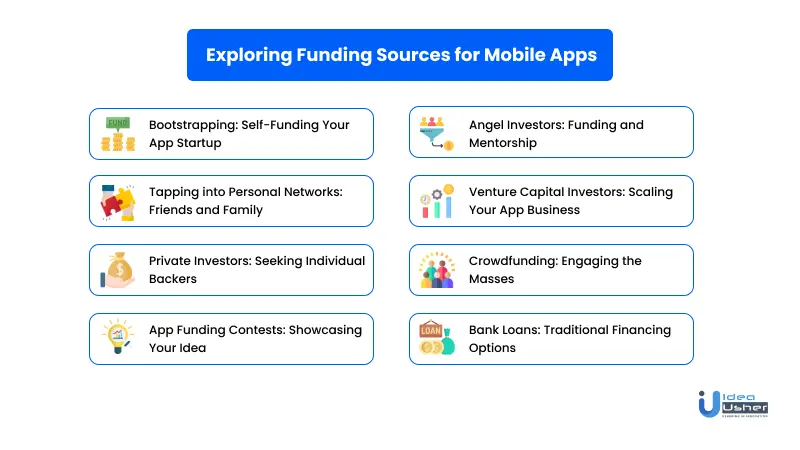
There exists a wide range of funding sources. Each of these options has its own unique advantages and can open doors of opportunity for your app. By being open-minded and exploring these diverse funding avenues, you usher your dreams into reality and see your app reach its full potential.
I. Bootstrapping: Self-Funding Your App Startup
Bootstrapping involves using your personal savings or revenue generated from your app to fund its development. This approach gives you full control and avoids giving up equity or incurring debt. However, sustaining can be challenging if you don’t have significant personal resources. Therefore, careful financial planning and resource management are essential when relying on bootstrapping as a funding strategy for your app.
II. Tapping into Personal Networks: Friends and Family
Reaching out to friends and family can be an initial source of funding. These individuals may be willing to invest in your app because they believe in you and your idea. However, it’s crucial to approach these relationships professionally and ensure clear communication about expectations and potential risks. Maintaining transparency and managing expectations thus is crucial to secure funding and preserving personal relationships.
III. Private Investors: Seeking Individual Backers
Private investors, such as high-net-worth individuals or angel investors, can provide financial support in exchange for equity or convertible notes. These investors often bring industry expertise, connections, and mentorship to help accelerate your app’s growth. However, finding the right private investors who align with your vision and goals can be challenging.
IV. App Funding Contests: Showcasing Your Idea
App funding contests and pitch competitions provide a valuable platform to present your app idea and potentially secure financial support. They offer exposure to investors, industry experts, and potential partners, validating your concept and increasing visibility.
While winning can bring substantial benefits, such as funding and partnerships, it’s important to acknowledge the intense competition. Success is not guaranteed, and even exceptional ideas may not secure funding. Preparation is key, ensuring a compelling pitch that clearly communicates your app’s unique value proposition and market potential.
V. Angel Investors: Funding and Mentorship
Angel investors are individuals or groups who invest their own capital in startups in exchange for equity. They often bring not only financial resources but also valuable industry knowledge, experience, and networks. Building relationships with angel investors can be a valuable asset in the early stages of your app’s development.
However, angel investors are selective in their investments and may receive numerous pitches from entrepreneurs seeking funding. Additionally, finding investors who align with your app’s vision and goals is essential. Thorough research to identify the right angel investors is crucial who can provide funding and offer strategic guidance and mentorship to help drive your app’s success.
VI. Venture Capital Investors: Scaling Your App Business
Venture capital firms invest in startups with high-growth potential.
They provide substantial funding in exchange for equity and actively support scaling and market expansion. However, venture capital funding typically comes with high expectations for rapid growth, and entrepreneurs may have to relinquish some control over their app’s direction.
VII. Crowdfunding: Engaging the Masses
Crowdfunding platforms allow you to raise funds from a large number of individuals who contribute smaller amounts. It’s an effective way to engage your target audience and validate market demand. However, successful crowdfunding requires effective marketing, a compelling story, and a well-executed strategy.
Therefore, before launching a crowdfunding campaign, you need to plan and prepare thoroughly. This way, you can not only secure the necessary funds but also validate market demand, gather early adopters, and create a community of supporters who believe in your app’s potential.
VIII. Bank Loans: Traditional Financing Options
Bank loans provide a traditional financing option for app development. They involve borrowing funds that must be repaid over a specified period, typically with interest. Bank loans may require collateral or personal guarantees, and the approval process can be rigorous.
By exploring these funding sources, you can determine which options align best with your app’s needs, stage of development, and growth aspirations. You need to carefully evaluate and choose the most suitable funding strategy.
Stages of Startup Funding for Mobile Apps
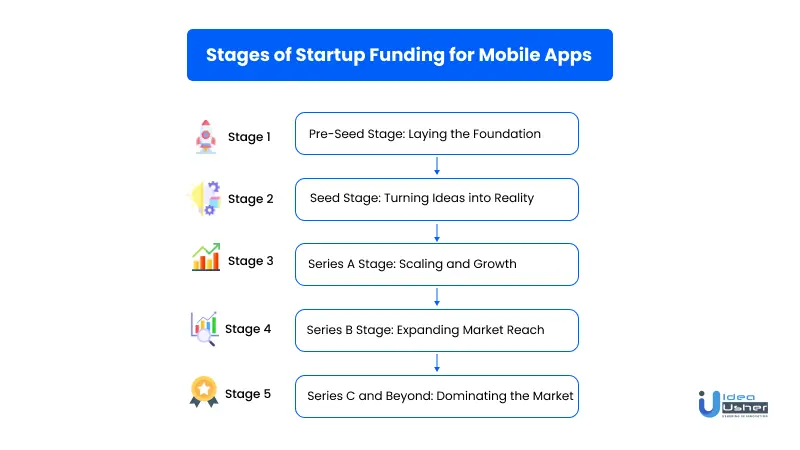
There are mainly five different stages of funding.
Each stage represents a significant milestone in the growth and development of your app, accompanied by varying funding needs. Let’s explore these stages in detail:
Stage 1) Pre-Seed Stage: Laying the Foundation
In the pre-seed stage, you are focused on laying the foundation for your app. This includes conducting market research, refining your app concept, and building a minimum viable product (MVP). Funding at this stage often comes from personal savings, friends and family, or bootstrapping.
Pre-seed funding can range from a few thousand dollars to around $500,000 on average.
Stage 2) Seed Stage: Turning Ideas into Reality
During the seed stage, you turn your ideas into tangible products and validate market demand. This involves further product development, user testing, and initial marketing efforts. Funding at this stage typically comes from angel investors, early-stage venture capital firms, or crowdfunding.
The average seed funding amount can range from $500,000 to a few million dollars.
Stage 3) Series A Stage: Scaling and Growth
The Series A stage marks the transition to scaling and rapid growth. At this point, you have a proven product-market fit and are ready to expand your user base and market presence. In this stage, venture capital firms primarily invest larger sums in exchange for equity.
Series A funding can range from a few million to tens of millions.
Stage 4) Series B Stage: Expanding Market Reach
In the Series B stage, your app is focused on expanding its market reach, acquiring more customers, and increasing revenue. Funding at this stage is typically aimed at scaling operations, improving infrastructure, and marketing efforts.
Venture capital firms continue to be the primary funding source, and the average funding amount in Series B can range from tens of millions to hundreds of millions of dollars.
Stage 5) Series C and Beyond: Dominating the Market
Series C and beyond are stages where established apps aim to dominate their market, expand internationally, or explore new product offerings. Funding at this stage often involves large-scale investments from venture capital firms, private equity firms, or even strategic acquisitions. The funding amounts can vary greatly, with hundreds of millions to billions of dollars being secured in these later stages.
It’s important to note that these funding amounts are general estimates and can vary significantly depending on factors such as the app’s industry, growth potential, competitive landscape, and the perceived value by investors. Additionally, securing funding at each stage is not guaranteed, and your app startup must demonstrate strong growth prospects, market traction, and a solid business plan to attract investors.
Strategies to Attract App Investors
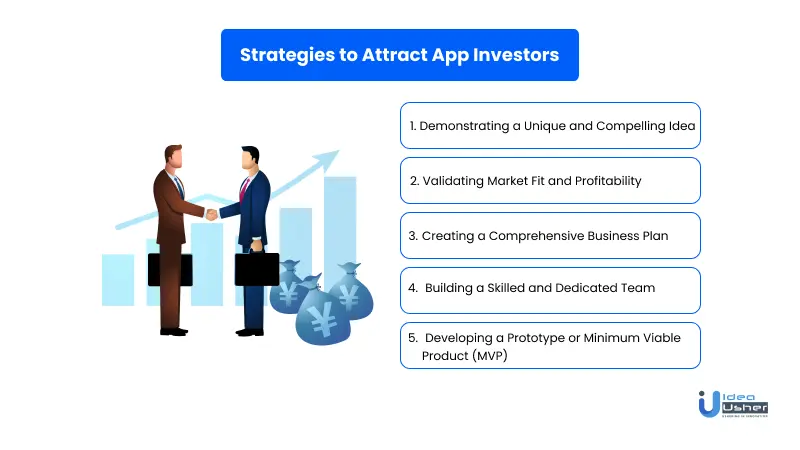
To successfully attract app investors, it’s crucial to employ effective strategies that showcase your app’s potential. Let’s delve into each strategy’s key factors and critical insights:
I. Demonstrating a Unique and Compelling Idea
A unique and compelling idea sets your app apart in a crowded market. Investors are seeking apps that offer something different and have the potential to disrupt or revolutionize an industry. Critical insights for this strategy include:
- Research the market thoroughly to identify existing solutions and gaps.
- Highlight what makes your app unique, whether it’s a new feature, innovative technology, or a fresh approach.
- Emphasize how your app addresses a pain point or solves a problem for users.
- Consider your idea’s scalability and long-term potential to attract investors looking for high-growth opportunities.
II. Validating Market Fit and Profitability
Investors want assurance that your app has market demand and the potential to generate revenue. Validating market fit and profitability requires:
- Conducting comprehensive market research to understand your target audience, competition, and market trends.
- Gathering feedback from potential users through surveys, interviews, or beta testing to validate the demand for your app.
- Showcasing data or evidence of market traction, such as pre-orders, early adopter interest, or successful pilot tests.
- Developing a revenue model demonstrating the app’s monetization strategy and the potential for sustainable profitability.
III. Creating a Comprehensive Business Plan
A well-crafted business plan is essential to attract investors and showcase your app’s potential for success. To create a comprehensive business plan, you need to:
- Clearly articulate your app’s vision, mission, and target market.
- Outline your marketing strategy to acquire and retain users.
- Include financial projections, such as revenue forecasts, expense breakdowns, and return on investment (ROI) analysis.
- Address potential risks and challenges and present mitigation strategies.
- Show a roadmap for future growth, including expansion plans and potential partnerships.
IV. Building a Skilled and Dedicated Team
Investors not only invest in the app but also the team behind it. Building a skilled and dedicated team includes:
- Identifying key roles needed for app development, marketing, and operations.
- Highlighting the expertise and experience of your team members.
- Emphasizing a track record of successful app development or relevant industry experience.
- Showcasing the dedication and commitment of your team to drive the app’s success.
- Clearly communicating the roles and responsibilities of each team member to demonstrate a well-structured organization.
V. Developing a Prototype or Minimum Viable Product (MVP)
Developing a prototype or MVP demonstrates the feasibility and potential of your app. To build a one-of-a-kind MVP strategy, you need to:
- Create a functional prototype or MVP that showcases the core features and user experience.
- Gather user feedback to identify improvements and validate the app’s usability.
- Highlight the scalability and extensibility of the app’s architecture.
- Showcase the technical capabilities of your development team.
- Present a clear roadmap for future feature enhancements and updates.
By comprehensively addressing these strategies and critical insights, you can attract the best among app investors. All of these strategies collectively will increase the confidence and trust of your investors, making your app more appealing as an investment opportunity.
Calculating Funding Requirements for Your App Startup
Funding your app startup requires careful calculation to make sure that you have the required resources. Let’s dive into the factors involved and how they contribute to determining your funding needs.
i) Conducting Market Research and Analysis
Before embarking on your app startup journey, conducting thorough market research and analysis is essential. Take the time to understand your target market – its size, demographics, and behavior. Study the competitive landscape and analyze existing apps in the market to assess their features and user experiences.
You can better understand user preferences and pain points by gathering insights through surveys, interviews, or focus groups. This research helps validate the market potential of your app and guides your decisions about development and marketing.
ii) Defining App Features and Functionality
Clearly defining the features and functionality of your app is another key factor. Make a comprehensive list of features that align with your target market’s needs and expectations. Prioritize these features based on their importance and their impact on the user experience.
If your app has unique or innovative features, be aware that they may require additional development or investment. By clearly defining your app’s features, you can estimate the resources needed more accurately.
iii) Estimating Development Costs and Timelines
Estimating development costs and timelines are critical in calculating your funding requirements. Break down the development process into key stages: design, frontend/backend development, testing, and deployment.
Consider the complexity of your app’s features and any technical challenges that may arise. Research industry rates for app development services or consider hiring an in-house development team. This estimation will help you understand the financial investment required to bring your app to life.
iv) Determining Marketing and Launch Expenses
Marketing your app and launching it successfully require financial resources. Identify the marketing channels that align with your target audiences, such as social media advertising, influencer partnerships, or app store optimization.
Budget for pre-launch marketing activities, user acquisition campaigns, and ongoing marketing efforts. Additionally, factor in app store fees, PR activities, app localization, and promotional materials. These expenses are essential for creating awareness and driving user adoption.
v) Accounting for Contingencies and Future Growth
Account for contingencies and future growth when calculating your funding requirements.
Allocate a contingency budget to cover unforeseen expenses or potential delays in the development process. Consider the costs associated with future updates, feature enhancements, and ongoing maintenance. As your user base grows, you may need to hire additional staff or scale your infrastructure.
Doing this ensures that your funding requirements are realistic and adaptable to changing circumstances.
By carefully considering these factors, you can calculate a more accurate estimate of your funding requirements. Remember to regularly review and adjust your calculations as your app progresses through different stages of development and growth. Stay mindful of the evolving needs of your app and allocate resources accordingly to set yourself up for success.
Strategies to Outperform Competitors in App Funding
To outperform your competitors and secure app funding, it’s important to employ effective strategies that showcase your app’s unique value. Let’s delve into key strategies and relevant technologies that you can leverage:
I. Crafting a Compelling Pitch Deck
A compelling pitch deck will capture the investors’ attention and convey the essence of your app.
Use clear and concise language, captivating visuals, and a compelling narrative to highlight the problem your app solves and its potential impact.
Technologies such as presentation software (e.g., PowerPoint or Keynote) and design tools (e.g., Canva or Adobe Creative Suite) can aid in creating an engaging pitch deck.
Remember to focus on the app’s value proposition, target market, monetization strategy, and competitive advantage.
II. Leveraging Connections and Networks
Your personal and professional connections can provide valuable introductions and recommendations to potential investors. Engage with industry networks, attend conferences, and participate in startup events to expand your connections.
Platforms like LinkedIn and professional networking events can help you identify individuals with relevant industry experience or investment connections. Utilize customer relationship management (CRM) software, such as Salesforce or HubSpot, to effectively manage and nurture these connections.
III. Building Relationships with Industry Influencers
Establishing relationships with industry influencers can enhance your app’s credibility and attract investors. Engage with influencers through social media platforms like Twitter, Instagram, or YouTube, and participate in relevant discussions.
Collaborate with influencers by offering early access to your app, seeking their feedback, and leveraging their reach to promote your app to their audience.
Technologies such as influencer marketing platforms (e.g., Upfluence or AspireIQ) can facilitate finding and connecting with suitable influencers.
IV. Showcasing User Traction and Metrics
Investors are interested in apps with strong user traction and measurable metrics. Use tools like Google Analytics, Mixpanel, or Firebase Analytics to track user engagement, retention rates, and conversion funnels.
Showcase these metrics in your pitch deck or investor presentations to demonstrate the app’s growth potential.
Additionally, provide case studies or testimonials from satisfied users to highlight the app’s value. Remember to align your metrics with your target investors’ goals and expectations.
V. Seeking Mentorship and Industry Expertise
Participate in startup programs initiated by big sharks like Y Combinator or Techstars to gain access to mentors, networking opportunities, and potential investors. Seek mentors with experience in the app industry or have successfully secured funding.
Join startup incubators or accelerators that offer mentorship programs, providing guidance on app development and funding aspects. Online communities, industry forums, and networking events can also help connect you with seasoned professionals willing to share their expertise.
Following the above strategies, you can set yourself apart from competitors and attract app funding. Remember to adapt these strategies to your unique app and target audience, utilizing relevant technologies and tools to enhance your chances of success.
Ensuring App Funding Success: Tips and Best Practices
Securing app funding requires careful planning and execution. Consider these comprehensive strategies and critical insights to increase your chances of success:
Tip 1: Refine and Practice Your Pitch
Refine your pitch by clearly articulating the problem your app solves, the target market, and the unique value proposition. Practice confidently and seek feedback to make it compelling and concise, emphasizing growth and profitability.
Tip 2: Communicate a Clear Vision and Execution Plan
Investors want to see a clear vision for the future and a solid plan to execute it. Clearly articulate your long-term goals, market opportunity, and app solution. Outline a detailed execution plan with development milestones, marketing strategies, and a monetization roadmap to instill investor confidence in your app’s potential for success.
Tip 3: Conduct Due Diligence on Potential Investors
Just as investors evaluate startups, it’s crucial to conduct research on your potential investors. Research their investment track record, industry expertise, and network connections. Choose investors aligned with your app’s vision and values and who offer strategic guidance, industry connections, and mentorship, going beyond just funding.
Tip 4: Negotiate Terms and Conditions Properly
Navigate the negotiation process by understanding key funding terms such as equity share, board seats, and investor rights, seeking legal counsel, and defending your valuation. Strike a balance that aligns interests, negotiates favorable terms, and maintains a healthy working relationship with investors for your app’s success.
Tip 5: Consult with Legal and Financial Experts
Consult an experienced startup attorney to draft or review legal documents, such as shareholder agreements or term sheets. Engage a qualified accountant to manage financial aspects, including tax considerations and financial projections. Their expertise will help you navigate the complexities of funding deals and provide peace of mind.
Summing it All Up
To sum up, securing funding for your app requires a multifaceted approach. Recapitulating the various funding sources and strategies, from bootstrapping to angel investors, crowdfunding to venture capital, empowers you with a diverse toolkit.
However, embodying persistence and adaptability is equally crucial, as the funding journey can be challenging. Embracing a growth mindset allows you to learn from setbacks, iterate, and continuously improve.
Lastly, nurturing relationships with investors and mentors fosters valuable guidance and support throughout your app’s development. By combining these elements, you can unlock the funding opportunities necessary to bring your app vision to life and propel your startup toward success.
Get in touch with us now!
FAQs
Q) How can I launch an app with no money?
A) There are a few ways to launch an app with no money. One way is to use a no-code app builder. These tools allow you to create apps without any coding knowledge. Another way is to find a technical co-founder who can help you develop the app. You could also try crowdfunding or finding angel investors.
Q) Where do apps get funding from?
A) Apps can get funding from a variety of sources, including:
- Venture capital: Venture capitalists are investors who provide funding to startups in exchange for equity.
- Crowdfunding: Crowdfunding is a way to raise money from a large number of people. There are many different crowdfunding platforms available, such as Kickstarter and Indiegogo.
- Angel investors: Angel investors are wealthy individuals who invest in startups. Angel investors typically invest smaller amounts of money than venture capitalists.
- Friends and family: Friends and family can be a great source of funding for app startups. However, it is important to be careful when borrowing money from friends and family, as it can damage relationships if the startup is not successful.
Q) How do I get investors for my app?
A) There are a few things you can do to get investors for your app:
- Create a strong pitch deck: Your pitch deck should concisely and persuasively present your app. It should include information about your team, your app, and your market.
- Network with investors: Attend industry events and meet with investors one-on-one.
- Get your app featured in the press: Getting your app featured in the press can help you attract investors.
- Build a strong social media following: A strong social media following can show investors that there is demand for your app.
Q) Can I get a loan to develop an app?
A) Yes, you can get a loan to develop an app. However, it is important to be careful when taking out a loan, as you will have to repay the loan with interest.
Q) Do free apps get paid?
A) Yes, free apps can get paid. There are a few ways that free apps can generate revenue, including:
- In-app purchases: In-app purchases allow users to buy additional features or content for your app.
- Advertising: You can show ads in your app in exchange for payment from advertisers.
- Subscriptions: You can charge users a monthly or annual subscription fee to use your app.
Q) How much money do I need to start an app?
A) The amount of money you need to start an app will vary depending on the complexity of your app and the platform you are developing for. However, you should budget at least a few thousand dollars to get started.













Sayan Chakraborty